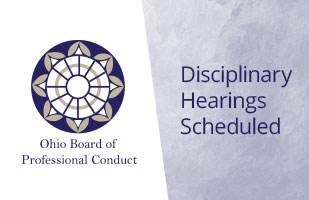Conduct Board Issues Four Advisory Opinions


The Ohio Board of Professional Conduct issued four advisory opinions regarding application of the Ohio Rules of Professional Conduct. Two opinions replace opinions previously issued by the board under the former Code of Professional Responsibility, and two opinions respond to requests for advice.
Advisory Opinion 2019-9 advises county prosecutors about conflicts of interest related to the concurrent representation of the State of Ohio and county agencies. The opinion concludes that some conflicts of interest may be resolved through the assignment and meaningful screening of assistant prosecutors or the hiring of outside counsel, but cautions prosecutors that the screening option is not available when the concurrent representation involves clients who are directly adverse to one another in the same proceeding.
Advisory Opinion 2019-10 instructs that a lawyer is prohibited from accepting a referral fee from a financial services group when the lawyer refers clients in need of financial services. The board concludes that the lawyer acquires a pecuniary material interest adverse to the client when entering into a referral-fee agreement with the financial services group, interferes with the lawyer’s duty of loyalty, and undermines the fiduciary relationship between the lawyer and client. This opinion replaces Adv. Op. 2000-1.
Advisory Opinion 2019-11 provides guidance to former magistrates who later enter private practice. The board opines that absent the consent of all parties, a magistrate is prohibited from representing a client in a post-decree matter when he or she previously served as a magistrate in the client’s original divorce or dissolution. The opinion also references the Ohio Ethics Law and concludes that the representation by the magistrate as a former public official is prohibited for 12 months after employment, regardless of whether consent of the parties is obtained. This opinion replaces Adv. Op. 2005-5.
Advisory Opinion 2019-12 prohibits probate court magistrates from engaging in an extrajudicial activity as eldercare coordinators in guardianship cases. The board concludes that under the Code of Judicial Conduct, magistrates, as judicial officers, may not act as arbitrators or mediators, or perform other functions apart from their official duties unless expressly authorized by law. As an extrajudicial activity, the board opines that because the appointment as an eldercare coordinator would disqualify the magistrate from hearing any matter stemming from the activity, the frequency of the disqualification would interfere with the official duties of the position of magistrate. The board also concludes that the magistrate’s dual appointment as an eldercare coordinator raises reasonable questions about the magistrate’s ability to impartially hear cases on their merits.
Acrobat Reader is a trademark of Adobe Systems Incorporated.


